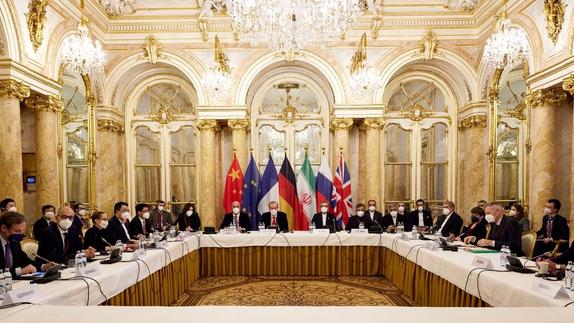 Photo taken on Dec 3, 2021 shows a meeting of the Joint Commission on the Joint Comprehensive Plan of Action in Vienna, Austria. The meeting was about talks on the nuclear issue of Iran. (EU DELEGATION IN VIENNA / HANDOUT VIA XINHUA)
Photo taken on Dec 3, 2021 shows a meeting of the Joint Commission on the Joint Comprehensive Plan of Action in Vienna, Austria. The meeting was about talks on the nuclear issue of Iran. (EU DELEGATION IN VIENNA / HANDOUT VIA XINHUA)
China and Russia have an important role to play as mediators in efforts to revive the 2015 Iran nuclear deal, experts say.
Talks on resurrecting the Joint Comprehensive Plan of Action, or JCPOA, are in their eighth round with negotiators gathering again in the Austrian capital Vienna.
The parties to the talks, which include Britain, China, France, Germany and Russia, aim to salvage the pact that offers sanctions relief for Iran in exchange for curbs on its nuclear program.
Russia and China are playing crucial roles in the Vienna talks and the sanctions waivers restored by the US are directly linked to both countries’ future roles in the potentially restored JCPOA, said Asif Shuja, senior research fellow at the Middle East Institute of the National University of Singapore
Nagapushpa Devendra, a researcher at the New Delhi-based Manohar Parrikar Institute for Defense Studies and Analyses, or MP-IDSA, said Iran needs guarantees from world powers like China and Russia as “it does not trust” the US, irrespective of who is running the White House.
Key negotiators have expressed optimism on prospects of the JCPOA’s revival as the US announced on Feb 4 that it was waiving sanctions on Iran's civil nuclear program, which had allowed Russian, Chinese and European companies to carry out non-proliferation work to deter Iran from using its sites for weapons development.
ALSO READ: EU: Iran nuke talks to resume in Vienna on Tuesday
Asif Shuja, senior research fellow at the Middle East Institute of the National University of Singapore, or NUS, said the waivers amount “to a goodwill gesture” by the US to China and Russia, which had helped Iran pull through amid punishing Western sanctions. He said Iran might later soften its stance given its ties with China and Russia.
Russia and China are playing crucial roles in the Vienna talks and the sanctions waivers restored by the US are directly linked to both countries’ future roles in the potentially restored JCPOA, Shuja said.
“In fulfilling Iran’s nuclear commitments, too, these two countries are most important. Such nuclear commitments include the shipping out of Iran’s low-enriched uranium from the country, supplying Iran the necessary enriched uranium for its research reactors, and redesigning Iran’s one or more advanced reactors. Iran will enter such partnerships with only those countries it trusts relatively more,” Shuja said.
“When the JCPOA was concluded in 2015, Russia had primarily played these roles. However, after Iran’s recently implemented 25-year strategic partnership with China, Iran may also trust China in these matters,” he said.
Chinese Foreign Ministry spokesperson Zhao Lijian said on Feb 7 that Beijing welcomes Washington’s decision to waive sanctions on Iran’s civilian nuclear program and that it believes it is “a step in the right direction”.
ALSO READ: Vienna talks: Iran rules out likelihood of 'interim deal'
He urged the US to correct its “wrong policy of maximum pressure on Iran” and that the Iranian side “should resume full compliance”.
Iran’s foreign ministry said Washington’s response will determine when an agreement can be reached. A spokesman was quoted by media as saying that significant progress has been made in “various areas of the Vienna negotiations”, including an assurance sought by Iran that the US would not breach the deal again.
Mahjoob Zweiri, director of Gulf Studies at Qatar University, believes Washington’s decision to restore the sanctions waivers falls within the verification and monitoring framework observed by the International Atomic Energy Agency, rather than a goodwill gesture.
“It is important to (remember) that the Vienna negotiations are about bringing the US and Iran (back) to the Joint Comprehensive Plan of Action… signed in 2015,” Zweiri said.
In 2018, the United States, under the presidency of Donald Trump, pulled out of the JCPOA and imposed fresh sanctions on Iran, prompting Tehran to walk back on its earlier commitments.
READ MORE: China calls for expanding consensus in Iran nuclear talks
With the current US administration, led by President Joe Biden, expressing interest in reviving the deal, there has been optimism for some breakthrough, but many issues are yet to be ironed out.
“The real Iranian concern is removing the sanctions, and this issue has not been offered by the US.”
Devendra from MP-IDSA said the sanctions waivers do not necessarily provide financial relief that would benefit the Iranians. She also said there is no guarantee that the US will not retrieve this sanction waiver or implement further sanctions in other sectors.
“The US will always consider Iran a threat to its interest in the region even if the JCPOA were restored,” said Devendra.
Xinhua contributed to this report.


